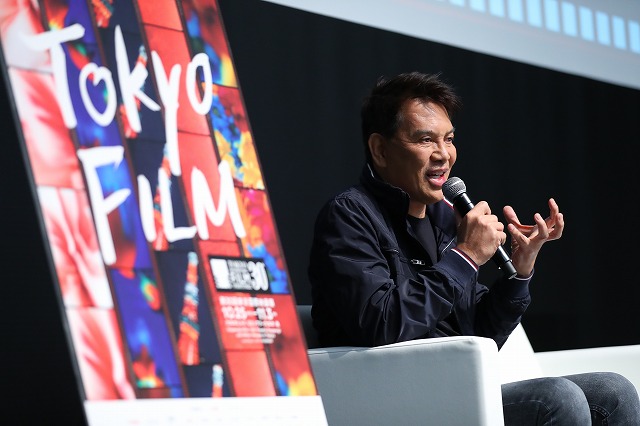
Schedule
Tickets
MarketOutline

You’ve got to be real.
That was the through-line at the TIFF Master Class led by Filipino director Brillante Ma Mendoza on October 26, in which a packed room of aspiring directors, actors and film fans in general got the chance to pick the brain of the acclaimed Filipino director.
With over a dozen feature films and multiple awards from major film festivals under his belt, Mendoza is one of the leaders of the Philippines’ Third Golden Age of cinema. Famed for his independent features, which authentically depict the lives of Filipinos, Mendoza has been especially praised for his work directing both professional and non-professional actors. In just one example, last year, Jaclyn Rose won the Best Actress award at Cannes for her role in Mendoza’s Ma’ Rosa.
Though the subtitle of the Master Class was “Working with Actors,” the hour-long conversation delved into a variety of aspects of filmmaking. But whether discussing screenwriting, working with actors, set design or editing, Mendoza emphasized one thing above all else: authenticity.
For many in the audience, the most surprising revelation from the director, who made his debut with the award-winning The Masseur in 2005, was that he does not give his actors a script.
“If you memorize a script, the emotions are made up. It’s not authentic,” said Mendoza. “The raw and sincere emotion is lost along the way.”
Instead, the director explained, he has his actors undergo a process of immersion, in which they’re paired with the real-life basis for their character in order to become familiar with how that person thinks, talks and reacts to different situations.
“Their immersion becomes their script,” the director explained.
In the same way, Mendoza often does not block scenes, so his cinematographers don’t know where the actors will be moving, giving the camera movements a spontaneous documentary feel.
These methods are all part of the director’s larger theory of filmmaking, which is centered around the key word “found.” That includes the aforementioned documentary-style “Found Cinematography,” as well as “Found Editing,” in which Mendoza’s editor treats the on-set footage as something that’s been “found.”
“[The editor] doesn’t really follow the script,” said Mendoza, “he just looks at the footage.”
Asked to give some advice to aspiring filmmakers, the director suggesting keeping things simple, noting new directors “try to incorporate everything, because it’s their first film.” Mendoza also emphasized that content is more important than form.
“You can learn form, but when it comes to content, you have to know it from the heart to communicate fully what you want to say.”
The director also revealed a reassuring piece of information for late bloomers: he didn’t direct his first film until he was 45.
Returning to the main theme of working with actors, Mendoza noted that while many of his actors are professionals, he also frequently casts non-professionals, as was the case for the film he shot just before coming to Tokyo.
“Pros and non-pros can learn from each other,” he said, noting that while non-professionals can learn about the technicalities needed for performing in front of a camera, pros can get a charge of authentic emotion from their non-professional counterparts.
Finally, Mendoza was asked what exactly he said to Jaclyn Rose to evoke the performance that won her the Best Actress award at Cannes — specifically, before the film’s final shot, which was singled out for praise by the jury of that festival. He replied that he tries to keep his direction simple.
“Feeling tired and hungry are some of the simplest things we feel as human beings. I told her, ‘you’re tired and hungry and want to eat.’”
Another very authentic piece of direction from this master of realism.